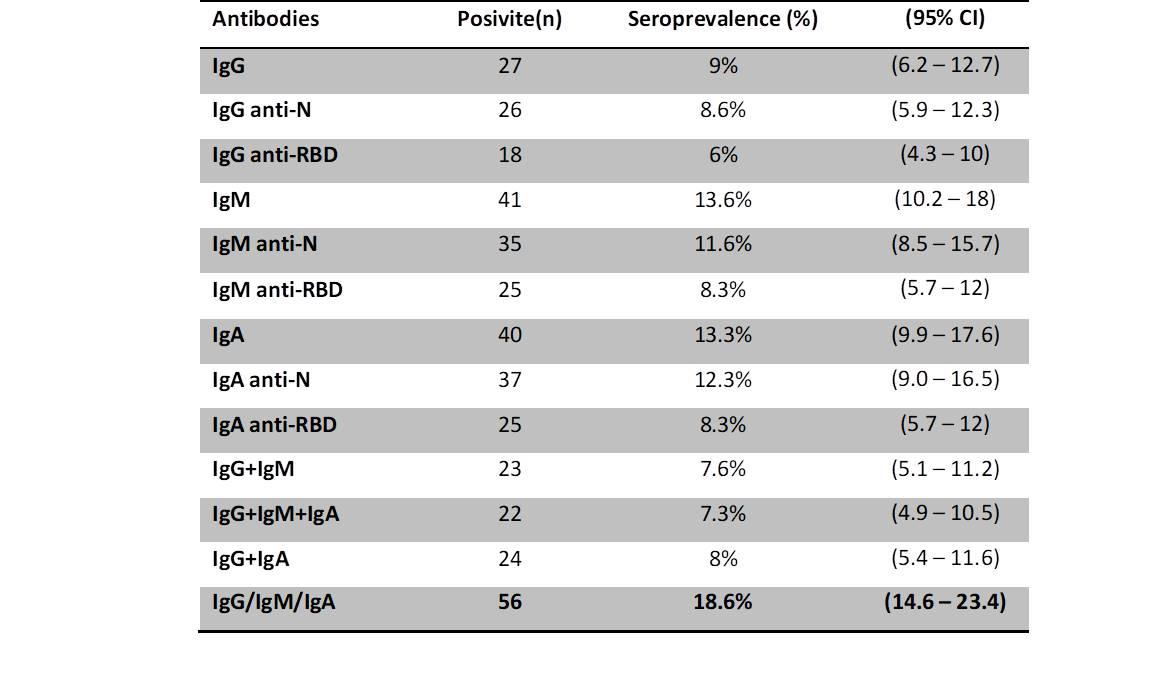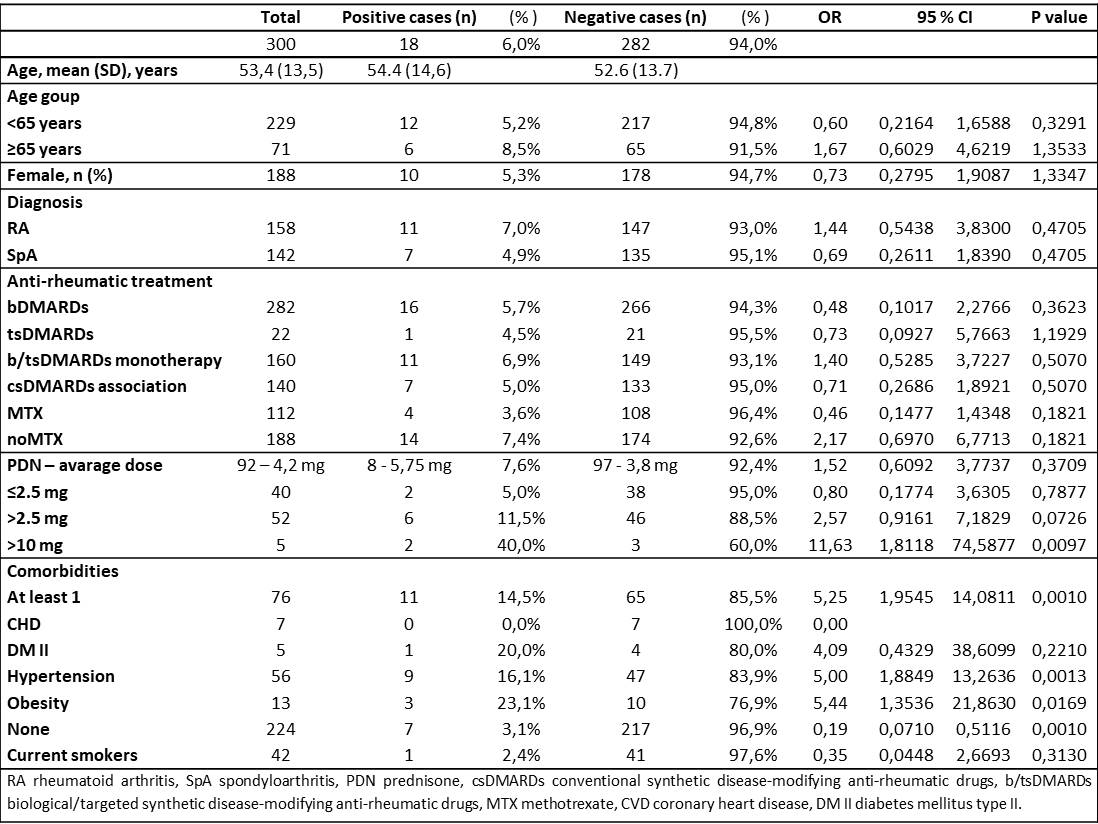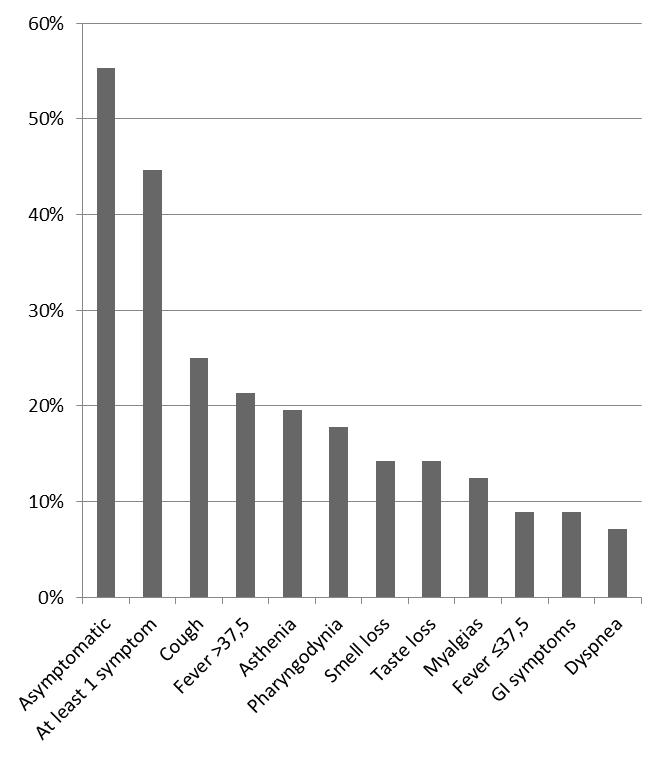Session Information
Date: Saturday, November 6, 2021
Title: Epidemiology & Public Health Poster I: COVID-19 & Vaccination (0084–0117)
Session Type: Poster Session A
Session Time: 8:30AM-10:30AM
Background/Purpose: Observational data have shown that rheumatic patients seem not to be more susceptible to SARS-CoV-2 infection neither to worse outcomes. However, the true prevalence of COVID-19 is still unknown due to the high proportion of subclinical infection. In this scenario, measuring the seroprevalence of SARS-CoV-2 may be crucial to improve the knowledge about the impact of COVID-19 in rheumatic patients.
The aim of this study is to estimate the prevalence of anti-SARS-CoV-2 antibodies in a large cohort of patients with rheumatoid arthritis or spondyloarthritis treated with biologic (b-) or targeted synthetic (ts-) DMARDs, living in a COVID-19 high-endemic area (Lombardy, Italy).
Methods: A seroprevalence cross-sectional study was conducted in the period between 4th May and 16th June 2020, including consecutive patients with confirmed RA or SpA treated with b- or tsDMARDs. Enrolled patients were tested for anti-SARS-CoV-2 IgG, IgM, and IgA antibodies against main viral antigens (nucleoprotein [N], receptor-binding domain [RBD]) using ELISA. Demographical and clinical data were also collected and patients were questioned about history of COVID-19 symptoms in order to identify potential factors that correlate with anti-SARS-CoV-2 positivity. Results were compared with those observed in the healthy population in the same period and region [1].
Results: The study population included 300 patients (62% females, mean age 53 years), diagnosed with RA (56%), psoriatic arthritis (23%), or ankylosing spondylitis (21%). Most patients were being treated with anti-TNF (57%), and the remainder were receiving abatacept (20%), anti-IL6 (11%), or JAK inhibitors (5%). Four patients (1.3%) referred a prior diagnosis of COVID-19 defined by nasopharyngeal swab. Immunoglobulin titers were evaluated resulting in 9%, 13.6%, and 13.3% positive patients for IgG, IgM, and IgA, respectively, with no significant difference to the healthy population. Among seropositive patients, 55.3% were asymptomatic, 16% had minor and 19.6% major symptoms, 7.1% were hospitalized. No deaths or admission to intensive care units occurred. No differences were found between seronegative and seropositive patients in relation to age, sex, rheumatic diagnosis, and treatments with b- or tsDMARDs. Conversely, corticosteroids therapy was associated with an increased risk of seropositivity in a dose-dependent manner with a significantly high OR for doses above 10 mg (OR 11.6, p 0.009). Relative increased risk was associated with the presence of at least one comorbidity (OR 5.25; 95%CI 1.95 – 14.08, p 0.001), especially hypertension (OR 5, p 0.001) and obesity (OR 5.4, p 0.01).
Conclusion: This study confirms that, even in a cohort of rheumatic patients, the spread of SARS-CoV-2 infection is much greater than that observed by capturing only swab-diagnosed COVID-19 cases, but consistent with healthy population. The underlying rheumatic disease and ongoing therapy with b/tsDMARD do not seem to impact SARS-CoV-2 antibody positivity, which conversely seems to be associated with the presence of comorbidities and with CS therapy. The project was co-financed by Lombardy Region 2014-2020 Regional Operational Programme under the European Regional Development Fund.
To cite this abstract in AMA style:
Maioli G, Favalli E, Pesce E, Biggioggero M, Bombaci M, Agape E, Martinovic M, Fabbris T, Zagato E, Favalli A, Gobbini A, Abrignani S, Grifantini R, Caporali R. The True Prevalence of SARS-CoV-2 Infection in an Italian Cohort of Patients with Inflammatory Arthritis: A Seroepidemiological Study [abstract]. Arthritis Rheumatol. 2021; 73 (suppl 9). https://acrabstracts.org/abstract/the-true-prevalence-of-sars-cov-2-infection-in-an-italian-cohort-of-patients-with-inflammatory-arthritis-a-seroepidemiological-study/. Accessed .« Back to ACR Convergence 2021
ACR Meeting Abstracts - https://acrabstracts.org/abstract/the-true-prevalence-of-sars-cov-2-infection-in-an-italian-cohort-of-patients-with-inflammatory-arthritis-a-seroepidemiological-study/



